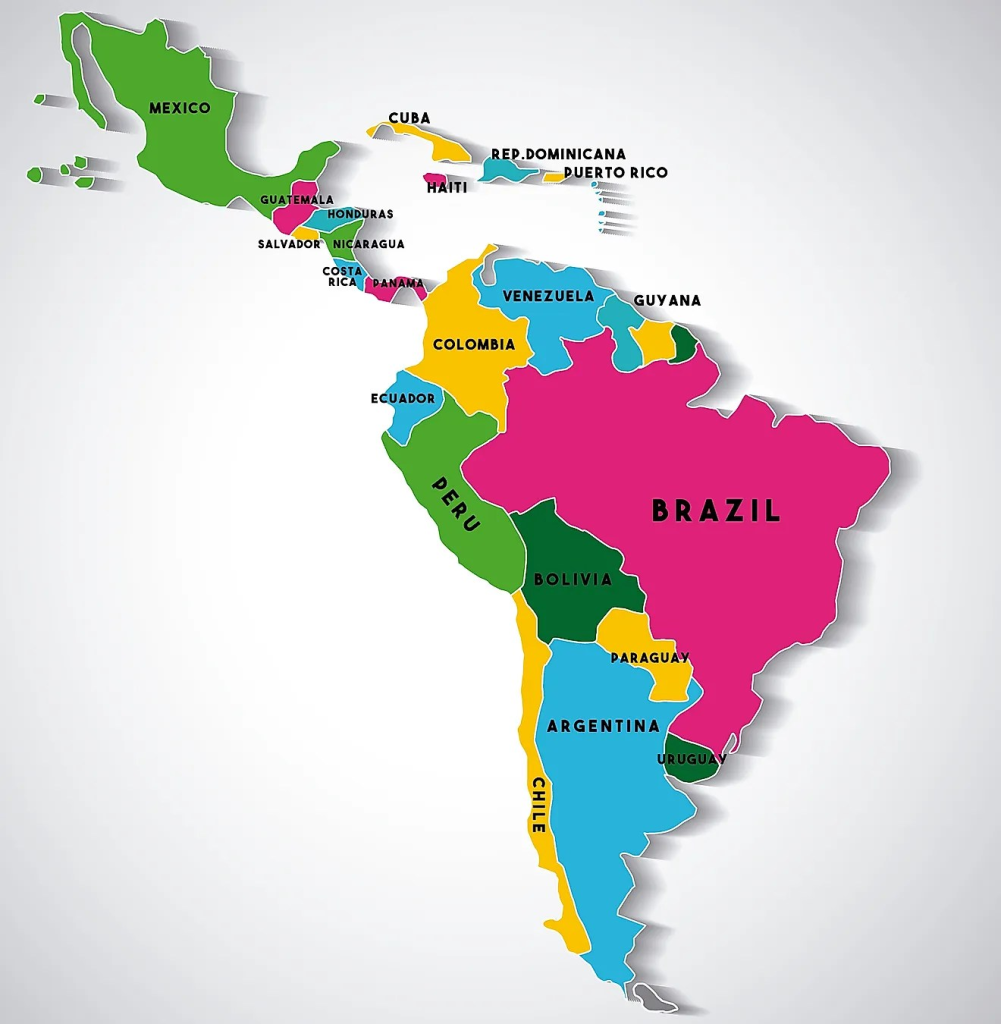America and Latin America share a complex and intertwined history that continues to shape the geopolitical landscape today. Pulitzer Prize winner Greg Grandin highlights this intricate relationship in his book “America, América,” emphasizing how the narratives of American and Latin American history diverge and overlap. From the significance of the Monroe Doctrine to the struggles for Latin American sovereignty, the perspectives of individuals in these regions reveal deep-rooted connections yet stark differences in worldview. While many in the United States often refer to America as synonymous with their own nation, Latin Americans see the term as encompassing a diverse and rich tapestry of cultures spanning from the Arctic to the Andes. This difference in understanding underscores the necessity for deeper engagement with Latin American perspectives to foster mutual respect and cooperation within the hemisphere.
The cultural and historical dynamics between the United States and its southern neighbors reflect a broader discourse surrounding identity and influence in the Americas. This relationship has evolved over centuries, characterized by varying interpretations of key doctrines and events that have shaped intercontinental relations. The interaction between American ideals and the realities of Latin America has fueled debates on sovereignty and independence, fostering a rich dialogue that is often overlooked. By unpacking the layers of Latin American history, we can better appreciate how these nations have contributed to the collective identity of the Americas. Understanding these nuances is essential for building a constructive and equitable partnership in the modern world.
The Evolution of America’s Identity in Latin American Thought
The identity of ‘America’ has long been a contested concept between the United States and Latin America. To many in Latin America, America represents an integrated identity that encompasses the entirety of the continent, stretching from Alaska to Tierra del Fuego. This understanding transcends the U.S. perception, which narrowly defines ‘America’ as the United States alone. As Greg Grandin notes in his book ‘America, América,’ this divergence in interpretation shapes how historical events—like the U.S. involvement in Latin American independence movements—are viewed. Latin Americans often see their history as inextricably linked to the broader narrative of America, challenging the conventional U.S. narrative that tends to marginalize them. The broader definition of America allows Latin Americans to reclaim historical agency and assert a more inclusive version of history that highlights common struggles against colonialism and oppression throughout the continent.
This conflict over the definition of America is evident in contemporary political discourse. For instance, President Trump’s executive order renaming the Gulf of Mexico to the ‘Gulf of America’ underscores this tension. By attempting to assert the dominance of the United States in the region, he inadvertently highlights how Latin Americans view the term as representative of a shared continent. This act sparked discussions around sovereignty and recognition among Latin American nations, suggesting that the complexities of identity extend beyond mere geography. As Latin Americans continue to navigate the implications of such changes, they assert their historical narratives—reminding the world that their contributions and experiences are crucial to understanding what America truly means.
The Monroe Doctrine: A Dual Perspective
The Monroe Doctrine, articulated in 1823, serves as a pivotal point in the U.S.-Latin America relationship, symbolizing both protection and paternalism. Initially, Latin Americans viewed the doctrine as a potentially supportive declaration for their independence struggles against European colonial powers. Figures like Simón Bolívar celebrated Monroe’s assertion that the Western Hemisphere was off-limits to European intervention, believing it indicated solidarity with their fight for sovereignty. However, the doctrine’s underlying implications also suggested a unilateral power dynamic, as subsequent U.S. interventions in Latin America indicated a willingness to impose U.S. interests over genuine partnership. This duality exemplifies the continued complexities in how Latin American nations perceive U.S. intentions within the framework of the doctrine.
As U.S. presidents invoked the Monroe Doctrine to justify interventions, Latin American perceptions shifted from hope to skepticism. Over time, leaders began to view the U.S. as an aggressor rather than an ally. Bolívar’s disillusionment with American intentions reflects a deeper narrative about interference cloaked under the guise of liberation. The constant reinterpretation of the Monroe Doctrine has allowed for varied understandings of sovereignty and intervention, with Latin American leaders often arguing for mutual respect and equality in international relations. This ongoing discourse invites a reconsideration of America’s role in Latin America—not merely as a settler-in-charge but as a collaborator in seeking mutual progress and understanding.
The Historical Impact of Spanish Colonialism on America’s Identity
The Spanish colonial legacy profoundly impacted the development of America’s identity, particularly when viewed from a Latin American perspective. Figures like Bartolomé de las Casas, who documented the brutalities committed against Indigenous populations, played a critical role in shaping an alternate narrative to the glorified accounts of conquest often celebrated in the mainstream. His works shed light on the suffering endured by the Indigenous peoples during colonization and prompted debates that resonate with contemporary discussions about justice and reparative history. This dual narrative emphasizes the atrocities of colonial rule while highlighting the resilience and dignity of Indigenous cultures, underscoring the importance of retelling history through varied perspectives.
Moreover, this historical context is essential for understanding the current dynamics of America as a concept transcending borders. The colonial history that mingles Indigenous, African, and European influences has fostered a rich tapestry of identities across Latin America. As Grandin argues, the implications of this colonial past continue to influence relationships between Latin America and the U.S., affecting perceptions of sovereignty and self-determination. By acknowledging this complex history, Latin Americans assert their rightful place within the broader narrative of America, advocating for recognition of their unique contributions, cultures, and sovereignty.
Cultural Expressions of Latin American Identity in America
Cultural expressions among Latin Americans present a profound narrative filled with rich histories and contemporary realities. From literature to visual arts and music, the artistic contributions from Latin American countries celebrate shared identities while addressing social and political issues pertinent to the region. As these cultural artifacts circulate globally, they challenge the U.S.-centric narrative of the Americas and invite audiences to embrace diverse perspectives on what it means to be part of America. Festivals, art exhibits, and literature from Latin American voices serve as powerful reminders of the region’s vibrancy and its integral role in the continental landscape.
Latin American artists and thinkers often draw inspiration from their historical struggles against colonialism and their ongoing quest for sovereignty. This drive manifests not only in artistic expression but also in social movements advocating for change. The works of Latin American authors and artists highlight a collective identity forged through shared experiences of oppression and resistance, emphasizing the importance of unity within diversity. As they navigate their roles in the cultural narrative of America, these expressions inevitably reshape perceptions about identity, power, and the very essence of being American in the 21st century, ultimately advocating for a more inclusive understanding of what America signifies.
Revisiting the Legacy of Historical Figures in Latin American Sovereignty
Historical figures such as Simón Bolívar and Bartolomé de las Casas offer critical insights into the struggles for sovereignty in Latin America. Bolívar’s vision for a unified American continent was underpinned by his belief in liberation from colonial powers and the establishment of sovereign states. His writings and actions laid the groundwork for the emergence of national identities among various Latin American countries. However, understanding Bolívar’s vision requires acknowledging the complexities of his relationships with the U.S. and other powers. Bolívar’s initial admiration for the American political model turned to disillusionment as he witnessed U.S. interventions in Latin American affairs, embodying a crucial lesson about the importance of autonomy and self-determination in the pursuit of true sovereignty.
Likewise, de las Casas provides a poignant narrative emphasizing the moral imperatives of the colonial encounter. His advocacy for Indigenous rights in the face of brutal colonial exploitation speaks volumes about the early notions of human rights within the context of Latin America. By holding a mirror to the actions of the conquistadors and their moral justifications, de las Casas emphasizes the need for accountability and reflects ongoing struggles against systemic injustices in contemporary Latin America. These historical figures remind us that the fight for sovereignty is deeply rooted in a complex historical context, shaping how nations understand their identities as part of the broader American continent.
The Influence of Latin American Perspectives on U.S. Policies
Latin American perspectives have challenged and influenced U.S. policies in various historical contexts, reshaping the narrative regarding the Americas. For instance, the pushback against U.S. interventions in the region has galvanized movements advocating for sovereignty, equity, and self-governance across Latin America. Activists and leaders frequently invoke the ideas put forth by historical figures like Bolívar, emphasizing the importance of mutual respect and partnership rather than interventionist tactics. As Latin American countries navigate complex international relations, their voices increasingly advocate for reform in how the U.S. engages with the region, pushing for policies that prioritize dignity, ethical diplomacy, and collaboration.
Moreover, awareness of Latin American histories has led to a re-evaluation of the hegemonic narrative often propagated in the U.S. This burgeoning understanding highlights the necessity of seeing the Americas as interconnected, reflecting how U.S. domestic policies can have profound implications for its neighbors to the south. By recognizing the historical significance of figures such as Bolívar and de las Casas, policymakers and the public can better contextualize the contemporary tensions that occur within the Americas, encouraging mutual growth and understanding.
Understanding Shared Histories: Interconnections Between America and Latin America
The shared history of America and Latin America is marked by interconnected narratives shaped by colonial legacies, political aspirations, and cultural exchanges. As Greg Grandin’s work illustrates, the histories of the two regions cannot be understood in isolation; rather, they reflect a complex tapestry of interactions that have shaped national identities and political ideologies. The historical contributions of Latin American nations to U.S. independence and their crucial roles in continental movements for freedom underscore the profound interconnectedness of the Americas, challenging simplistic notions of American supremacy.
Moreover, exploring shared histories fosters greater comprehension of contemporary issues affecting both regions. Be it through trade, migration, or cultural exchanges, the interactions between the United States and Latin America continue to build cross-cultural ties. Recognizing these connections allows for a more nuanced view of the relationships between nations, encouraging dialogues that honor historical realities while paving the way for collaborative futures. Together, America and Latin America can work towards a mutual understanding that values respect, equity, and shared aspirations for prosperity.
Challenging Historical Narratives: The Role of Progressive Latin American Voices
Progressive Latin American voices have increasingly challenged historical narratives that have traditionally sidelined their contributions to the broader American story. By illuminating the sacrifices made by Indigenous peoples, African descendants, and the politically marginalized, these voices advocate for a more inclusive understanding of their roles throughout history. Figures like local activists, historians, and artists are reconsidering the powerful impact of colonial histories on current socio-political dynamics, inviting society to acknowledge the multiplicity of identities that comprise the cultural fabric of America. This challenge encourages critical dialogues about representation, authenticity, and collective memory.
In re-examining these narratives, contemporary Latin American thinkers strive to redefine what it means to be part of America. This pursuit often intersects with efforts to realize sovereignty and advocacy for marginalized communities, paralleling broader movements for social justice globally. By weaving together personal and historical accounts of struggle and triumph, these voices enrich the cultural landscape of America, ensuring that diverse experiences are woven into the tapestry of its identity. Ultimately, a more inclusive narrative not only honors the contributions of Latin Americans but also reshapes the future, promoting understanding and cooperation throughout the Americas.
Frequently Asked Questions
What is the significance of America to Latin Americans according to Greg Grandin?
In ‘America, América,’ Greg Grandin discusses how America to Latin Americans represents not just the United States, but a broader identity encompassing all of the Americas, highlighting the historical and cultural ties that bind the continent together. This perspective contrasts with the U.S. view that often sees America as synonymous with the United States, thereby redefining the significance of America in a Latin American context.
How does the Monroe Doctrine impact Latin American sovereignty?
The Monroe Doctrine, articulated by President James Monroe in 1823, has had profound implications for Latin American sovereignty. Initially viewed as a protective measure against European intervention, it often became a justification for U.S. interventions in Latin America, undermining the region’s sovereignty and fostering resentment among Latin American nations towards U.S. dominance.
What is the Latin American perspective on the historical relations with America?
From a Latin American perspective, the historical relationship with America involves a complex narrative of struggle for independence, cultural exchanges, and critiques of U.S. imperialism. Figures like Simón Bolívar envisioned a unified America where Latin American nations could assert their sovereignty and resist domination, illustrating the diversity of thought within the region regarding their role on the global stage.
How did Simón Bolívar’s views reflect Latin American aspirations for America?
Simón Bolívar, a pivotal figure in Latin America’s fight for independence, viewed America as a model for political virtue and moral rectitude. His belief in a united America, free from monarchy, emphasizes the aspirations of Latin Americans for sovereignty and self-determination, contrasting sharply with the paternalistic attitudes held by some U.S. Founding Fathers.
How does ‘America, América’ contribute to our understanding of the historical narrative of the Americas?
Greg Grandin’s ‘America, América’ offers a vital narrative that aligns Latin American perspectives with the broader history of the Americas, challenging the Eurocentric views often predominant in historical discourse. By emphasizing the interconnectedness of the continent’s history, Grandin highlights the importance of Latin American experience in understanding the complex identity of America.
What role did Spanish America play in the American Revolutionary War?
During the American Revolutionary War, Spanish America played a crucial role by providing support and military assistance, particularly through the efforts of figures like Bernardo de Gálvez, who led troops against British forces. This collaboration illustrates the interconnectedness of America’s fight for independence and the involvement of Latin America, challenging narratives that isolate U.S. history.
In what ways has America been interpreted differently by U.S. leaders and Latin American leaders?
American leaders have traditionally viewed the continent as a sphere of influence to be dominated, as reflected in the Monroe Doctrine. In contrast, Latin American leaders have often emphasized sovereignty and mutual respect among nations, advocating for a more collaborative interpretation of America’s identity that recognizes the significance of all nations within the hemisphere.
How does cultural identity shape the concept of America in Latin America?
Cultural identity in Latin America plays a significant role in shaping the concept of America, as it encompasses a rich tapestry of Indigenous, African, and European influences. This multifaceted identity not only challenges the singular view of America as the United States but also enhances Latin Americans’ sense of belonging to the broader Americas, reinforcing their historical and cultural ties.
| Key Point | Details |
|---|---|
| Trump’s Executive Order | Changed ‘Gulf of Mexico’ to ‘Gulf of America’, asserting U.S. dominance. |
| Meaning of America | In the U.S. context, ‘America’ means the U.S.; for Latin Americans, it includes all the Americas. |
| Historical Context | Latin Americans have historically been misperceived as outsiders despite contributing to U.S. independence. |
| Bolívar’s Vision | Believed in a unified Americas, unlike U.S. Founding Fathers who saw Latin Americans as unequal. |
| Monroe Doctrine | Initially seen as supportive of Latin American independence, later criticized for justifying U.S. intervention. |
| Consequences of U.S. Actions | U.S. interventions in Latin America were often justified through varying interpretations of the Monroe Doctrine. |
| Perception of ‘American’ Identity | Latin Americans share a deep connection to the identity of the Americas, contrasting with U.S. perspectives. |
Summary
America and Latin America share a complex narrative rooted in historical interpretations and identity. The recent discourse surrounding the definition of ‘America’ and its implications highlights the ongoing struggle over recognition within the hemispheric context. As Latin Americans embrace their integral role in the broader fabric of the Americas, this relationship prompts a reevaluation of past narratives, shedding light on their significant contributions and the need for mutual respect moving forward.



